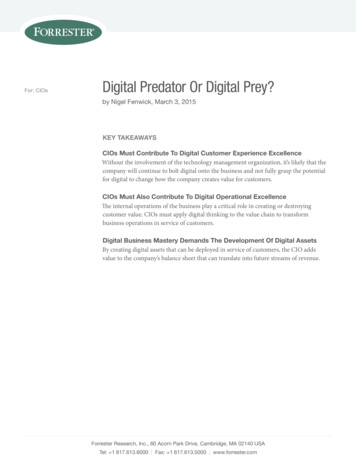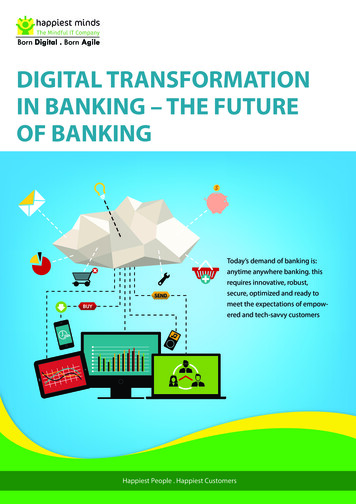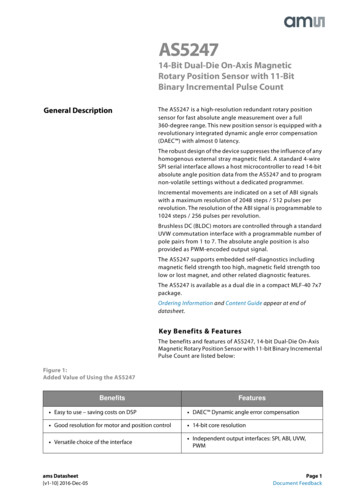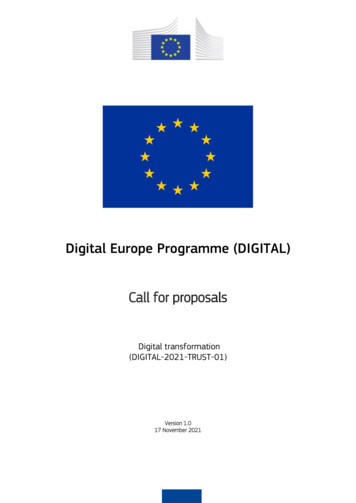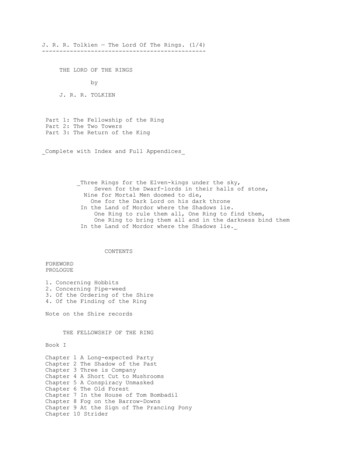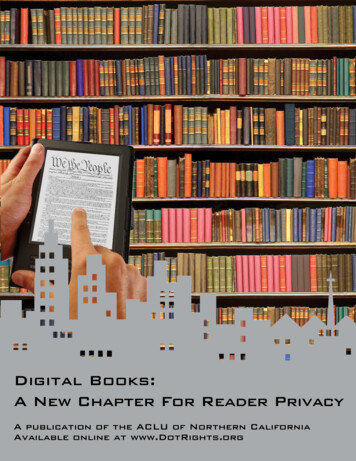
Transcription
Digital Books:A New Chapter For Reader PrivacyA publication of the ACLU of Northern CaliforniaAvailable online at www.DotRights.org
What you choose to read says a lot about who you are, what you value, and what youbelieve. That is why you should be able to read about anything from politics to healthwithout worrying that someone is looking over your shoulder. However, as books moveinto digital form, new reader privacy issues are emerging. In stark contrast to libraries that retain as littleinformation about readers as possible, digital book services are capturing detailed information aboutreaders including who they are, what books they browse and read, how long a given page is viewed, andeven the notes written in the “margins.” Without strong privacy protections, all of this browsing andreading history can be collected and analyzed and could end up in the hands of the government or thirdparties without the reader’s knowledge or consent. Retaining and strengthening reader privacy in thedigital age requires a thorough examination of the potential privacy and free speech implications of digitalbook services and the establishment of laws and policies that properly protect readers.Digital Books: A New Chapter for Reader Privacy is the second in a series of issue papers by the ACLUof Northern California that discuss new technology trends and their consequences. This paper examinesthe history of reader privacy and explores opportunities for consumers, businesses, and policymakers towork together to update and enhance these protections.Part I of this paper discusses the history of strong legal and policy protections for reader privacy. Part IIcovers the emerging privacy issues related to digital book services, and Part III evaluates whetherexisting legal protections are sufficient to address these issues. Finally, Part IV proposes policy andlegislative steps that should be taken to safeguard reader privacy for the digital age. For moreinformation about digital books and other online privacy and emerging technology issues, please visit theACLU of Northern California Demand Your dotRights campaign website at www.dotrights.org.
CONTENTSINTRODUCTION .1PART I: History of strong protections for reader privacy.2Part II: Digital Book Services Without Strong Protections Havethe Potential to Threaten a Long and Proud History of ReadingPrivacy 3PART III: Current Safeguards for reader privacy May BeInadequate to protect readers and companies’ bottom line . . 6PART IV: Next steps to protect digital reader privacy . 8CONCLUSION .9ENDNOTES . . 10AUTHOR: Nicole A. Ozer, Technology and Civil Liberties Policy Director, ACLU of Northern CaliforniaThis issue paper is based on research and material produced in collaboration with the Samuelson Law, Technology, and PublicPolicy Clinic at UC Berkeley School of Law, the Electronic Frontier Foundation, and the ACLU National staff. Thank you toJennifer Lynch, Cindy Cohn, Jason Schultz, Shane Witnov, Chris Conley, Hari O’Connell, Tamar Gubins, and the staff of theACLU First Amendment Working Group and Technology and Liberty Project for their assistance with this issue paper.DESIGN: Gigi Pandian and Monique Pham, ACLU of Northern CaliforniaFor more information about digital books and other online privacy issues, please contact the Technology and Civil LibertiesProgram at the ACLU of Northern California and visit our online privacy website at www.dotrights.org.The ACLU of Northern California wishes to thank the following funders for their support of this publication:Block v. eBay cy pres fundCalifornia Consumer Protection FoundationConsumer Privacy Cases cy pres fundRose Foundation for Communities and the EnvironmentThe David B. Gold FoundationPublished by the ACLU of Northern California, March 2010
INTRODUCTIONIt has long been recognized that the freedom to read without worrying about who is looking over your shoulder plays anessential role in the freedom of thought and speech necessary for a robust democracy. When the government and thirdparties have tried to collect and use evidence of reading habits in order to identify individuals with unpopular thoughtsand beliefs, pivotal court decisions, state laws, and the ethics of librarians and booksellers have safeguarded the privacyand free speech of readers and helped to support the free exchange of ideas and open discourse. As ever-increasingnumbers of readers move from physical books and libraries to digital book services, it is imperative that reader privacy besafeguarded.Digital book services can provide consumers with many benefits such as access to books that might not be locallyavailable, the ability to quickly search through books for specific words or phrases, and the ability to carry hundreds ofdigital books on a device that weighs less than a single hardcover. But readers must not be forced to pay for theconvenience of digital books with their privacy.Many consumers do not realize that digital book devices and online services have the ability to collect far moreinformation about individuals and their reading habits than has been possible in the offline world. Furthermore, manyproviders have a strong economic incentive to retain this information for long periods of time to support an advertisingbased business model. Finally, once information about consumers and their reading habits are collected, that informationcan be vulnerable to demands from the government and third parties.As digital books become more popular, it is critical for companies, policymakers, and public interest groups to worktogether to: (1) develop robust protections related to information collection, use, and disclosure of digital book records;(2) aggressively defend reader privacy; and (3) update and develop new laws to ensure clear protections for digitalreading records.Part I of this paper discusses the history of strong legal and policy protections for reader privacy. Part II covers theemerging privacy issues related to digital book services, and Part III evaluates whether existing legal protections aresufficient to address these issues. Finally, Part IV proposes some policy and legislative steps that should be taken tosafeguard reader privacy for the digital age.In several areas of the paper we have more questions than answers. It is our hope that this issue paper will help tosupport a robust conversation between consumers, businesses, and policymakers to address these important questionsabout digital books and develop plans to address potential gaps in the existing legal framework for protecting privacy andfreedom of expression.1online at www.dotrights.org
PART I: History of Strong Protectionsfor Reader PrivacyThere is a long and proud history of legal protection for readingprivacy in the United States. Decisions by the Supreme Court,other federal courts, and state courts have protected readerprivacy at crucial junctures. In the 1950s, the Supreme Courtupheld reader privacy, finding it unconstitutional for abookseller to be convicted for refusing to provide the“Once the government candemand of a publisher thenames of the purchasers of hispublications [f]ear of criticismgoes with every person into thebookstall [and] inquiry will bediscouraged.”-Justice douglas,government with a list of individuals who had purchasedunited states v. rumley (1953)political books. As Justice Douglas observed, “Once thegovernment can demand of a publisher the names of thepurchasers of his publications . . . [f]ear of criticism goes with every person into the bookstall . . . [and] inquiry will be1discouraged.” In the 1960s, the Supreme Court again protected reader privacy, striking down a requirement thatindividuals must file a written request with the postal service to receive “communist political propaganda” because such arequirement is “almost certain to have a deterrent effect.” The Court especially noted that “public officials, likeschoolteachers who have no tenure, might think they would invite disaster if they read what the Federal Government2says contains the seeds of treason.”3Federal and state courts have continued to set important precedents protecting reader privacy. When federalinvestigators attempted to use a grand jury subpoena to obtain Monica Lewinsky’s reading records from theKramerbooks bookstore in Washington, D.C., the court held that the First Amendment required the government to“demonstrate a compelling interest in the information sought . . . [and] a sufficient connection between the information4sought and the grand jury investigation . . . .” The Colorado Supreme Court similarly held that book records were clearlyprotected under the free speech provision of the Colorado state constitution, and in order to obtain such records, thegovernment must meet a warrant plus standard, requiring not only a warrant but a prior adversarial hearing, notice to the5provider, and showing of a compelling need.Protection for reading records has not been limited to the brick and mortar world. In a 2007 United States District Courtcase, the court quashed a government subpoena initially seeking the identities of 24,000 Amazon.com (hereinafterAmazon) book buyers because[I]t is an unsettling and un-American scenario to envision federal agents nosing through the reading lists of lawabiding citizens.[I]f word were to spread over the Net—and it would—that the FBI and the IRS had demandedand received Amazon’s list of customers and their personal purchases, the chilling effect on expressive ecommerce would frost keyboards across America . . . well-founded or not, rumors of an Orwellian federalcriminal investigation into the reading habits of Amazon’s customers could frighten countless potential customers6into canceling planned online book purchases, now and perhaps forever.2online at www.dotrights.org
Courts have recognized, in both the offline and online context, that reader privacy must be protected to avoid a chillingeffect on freedom of expression and maintain the trust of consumers. Digital book services should respect and defendthe rights of their readers and not disclose book records to the government absent a properly-issued search warrant or tothird parties absent a court order. However, courts have not yet had many opportunities to specifically consider digitalbook records, leaving their legal protection less clear than is the case for printed works.State Laws and Library Ethics Have Provided ImportantProtection for Reader Privacy and Free SpeechState laws and the dedication of librarians to safeguarding the rights of readers alsohave provided substantial additional support for anonymous reading. Virtually every7state protects public library reading records from disclosure by statute. In manystates, violating a public library reading record statute is a misdemeanor criminal8violation. In addition to safeguarding library patron records, Rhode Island and9Michigan both prohibit booksellers from disclosing information. For example,Michigan requires a warrant or court order before any business selling, renting, orlending books may disclose customer-identifying information. With these statutes,states have recognized the importance of having a citizenry that can access and read48 stateshave libraryconfidentialitylaws. Theremaining two,Hawaii andKentucky, haveAttorney Generalopinions insupport of readerprivacy.books without fear of monitoring.The American Library Association (ALA) also has dedicated itself to protecting reading privacy. The ALA’s Policy Manualguides all librarians that “the freedom to read is essential to our democracy” and “protecting user privacy andconfidentiality is necessary for intellectual freedom and fundamental to the ethics and practice of librarianship.”10TheLibrary Code of Ethics, first adopted in 1938, now reads:We protect each library user’s right to privacy and confidentiality with respect to information sought or received11and resources consulted, borrowed, acquired or transmitted.As online book services and e-readers grow in popularity, it will be important for both lawmakers and librarians to take anactive role in identifying and addressing threats to reader privacy in the digital age.Part II: Digital Book Services WithoutStrong Protections Have the Potentialto Threaten a Long and Proud History ofReading PrivacyIncreasingly, readers are moving away from reading physical books at bookstores, libraries, and in their homes andtoward reading on electronic devices and the Internet.12Google has spent the last five years digitizing millions of books3online at www.dotrights.org
from some of the United States’ biggest libraries and is attempting to finalize a settlement to make available most of the13books scanned in this endeavor.In the last few years, digital reading devices have been released by severalcompanies, including Amazon, Sony, and Barnes & Noble, and sales of digital books have been climbing. Without strongprotections in place, the growth of book services has the potential to threaten a long and proud history of reading privacy.Digital Book Service Providers Can Collect Much MoreData on Readers than Libraries or Bookstores EverCouldDigital book services have the ability to collect and retain verydetailed information about readers. The level of detail thatthese services can collect would require an offline library orbookstore to hire an agent to follow each individual patronGoogle Bookscurrently tracks:around the stacks, throughout their day, and finally into theirhomes. Digital book providers can easily track what books anindividual considers, how often a given book is read, how1) a reader’s initial searchquery;long a given page is viewed, and even what notes are writtenin the “margins.” As reading has moved online, it also has2) the specific book browsed andpage viewed;become much easier to link books that are browsed or readwith a reader’s other online activities, such as Internet3) the date/time of the search orpage view;searches, emails, cloud computing documents, and socialnetworking. With all of this information, companies can create4) the reader’s InternetProtocol address, browser,and computer operatingsystem; andprofiles about individuals, their interests and concerns, andeven those of their family and friends.This tracking is already occurring. For example, GoogleBooks currently tracks: 1) a reader’s initial search query; 2)5) one or more cookies thatuniquely identify the reader’sbrowser.the specific book browsed and page viewed; 3) the date/timeof the search or page view; 4) the reader’s Internet Protocoladdress, browser, and computer operating system; and 5)14one or more cookies that uniquely identify the reader’s browser.In a January 2009 New York Times article, a seniormember of Google Book Search’s engineering team illustrated the kind of detailed information that the company collects.He admitted that he “was monitoring search queries recently when one caught his attention.” The engineer could easilytell that the reader spent four hours perusing 350 pages of an obscure 1910 book.15If a reader has logged in to otherGoogle services such as Gmail at the time he searches for a book, Google can link reading data to the reader’s uniqueGoogle account. Google also retains the right to combine all this information with information gleaned from its16DoubleClick ad service, which tracks users across the Internet.4online at www.dotrights.org
Amazon can and does track similar information on readers whouse its Kindle. As each Kindle is unique and automaticallylinked to one particular account holder, the potential fortracking specific reading habits may be even greater than withGoogle Books. Amazon retains information about the books,magazine subscriptions, newspapers and other digital contenton the Kindle and the reader’s interaction with that content.This includes an automatic bookmark of the last page read, thecontent deleted from the device, and any annotations,bookmarks, notes, highlights, or similar markups made by the17reader.The company’s control over its users’ reading habitsextends beyond merely tracking them. Amazon’s ability tocontrol content on the Kindle has allowed it to delete whole18books without the account holder’s knowledge or consent.Once reader information is collected, it may stay in thecompanies’ files for an indefinite time. Google has onlypromised to make a “good faith effort” to provide users with theopportunity to delete personal information.19Amazon customersmust contact third-party advertisers and websites directly inAmazoncurrently tracks:1) the time each Kindle islogged onto Amazon’snetwork;(2) what other books, magazinesubscriptions, newspapersor digital content are onthe device;(3) each reader’s interactionwith content, including thelast pages read, anyannotations, notes orhighlights, and a record ofany content deleted fromthe device.order to access or opt out of their information collection20practices.Companies Have Strong Business Incentive to CollectInformationThere are strong incentives for companies to collect detailed information about readers and to retain it for as long aspossible. It is no secret that information about readers means more lucrative targeted advertising. In addition, by usingcollected information, companies may be able to attract customers who appreciate customized recommendations forbooks based on past reading history or interests.According to industry experts, companies can expect up to 10 times the revenue for advertisements based on behavioraldata.21 Google is no stranger to the concept that the more it knows about individuals, the higher the advertising profits,both for Google and for its advertising partners. Google’s CEO Eric Schmidt has explained that “the ads are worth more ifthey’re more targeted, more personal, more precise.”22Schmidt has made clear the company’s interest in amassing and analyzing as much information as possible about usersof all of its services. And according to Schmidt, Google’s current extensive data collection is just the tip of the iceberg:5online at www.dotrights.org
We are very early in the total information we have within Google. Thealgorithms will get better and we will get better at personalization. The goal isto enable Google users to be able to ask the question such as ‘What shall I dotomorrow?’ and ‘What job shall I take?’ [.] We cannot even answer the mostbasic questions because we don’t know enough about you. That is the most23important aspect of Google’s expansion.Google has not spent millions of dollars digitizing the world’s books out of the24goodness of its heart.Detailed information about the identity and interests ofmillions of readers collected through the Google Book Search product couldAccording toindustry experts,companies canexpect up to 10times the revenuefor advertisementsbased onbehavioral data.provide an important additional source of information for its algorithms and furtheraid in targeted advertising.Part III: Current Safeguards for ReaderPrivacy May Be Inadequate to ProtectReaders’ and Companies’ Bottom LineWhile there are economic incentives to collect information about readers, there are also important reasons, both for thepublic good and the bottom line, for robust reader privacy protections for digital book records. Readers are increasinglyconcerned about the extent to which their reading habits are tracked, and may abandon digital books if they feel theirprivacy is at risk. Unfortunately, some legal standards are outdated and may not extend the strong protections accordedto library and bookstore records to the records generated and held by digital book services.Readers Demand Privacy for Their Book RecordsThe tracking and retention of data on digital book services may chill people from accessing particular sites andpurchasing particular books if they fear how that information could end up being used or abused. This fear is notparanoia, but based on a long history of government and third party attempts to collect and use evidence of readinghabits in order to identify individuals with unpopular thoughts and beliefs. During the McCarthy hearings, Americans werequestioned on whether they had read Marx and Lenin and even whether their friends had books about Stalin on their25bookshelves.History repeated itself when, following September 11, the FBI demanded that libraries turn overinformation on patrons. It is estimated that by December 2001, 85 libraries had been approached by the FBI and thatmore than 200 libraries were targeted between 2001 and 2005.26But in these cases, and other situations where the rightto read has been under assault, pivotal court decisions, state laws, and the actions of librarians and booksellers havesafeguarded the privacy and free speech of readers and helped to support the free exchange of ideas and opendiscourse.When consumers feel their privacy is not being properly protected, businesses get the cold shoulder. When a grand juryissued a subpoena demanding that Kramerbooks disclose its patrons’ book purchases, many customers told the6online at www.dotrights.org
bookstore that they no longer would shop there because they believed that it had disclosed book records.27Consumershave also expressed strong dissatisfaction with targeted advertising business models that customize the advertisementsshown based on the websites a user has visited and the content she has viewed, even when assured that the tracking is“anonymous.” In a recent nationwide survey, 68 percent of adults said that they “definitely would not allow it.”28Further,69 percent feel there should be a law that gives people the right to know everything that a website knows about them and92 percent believe there should be a law that requires “websites and advertising companies to delete all storedinformation about an individual, if requested to do so.”29If there are not adequate protections in place to limit collection, retention, and use of detailed book records and tosafeguard that information from disclosure to third parties and the government, consumers are not going to feel confidentusing digital book services. Reducing the number of books that people feel safe accessing is not good for publicdiscourse or for a company’s bottom line.Current Privacy Laws May Not Adequately ProtectDigital Book ReadersUnfortunately, while new digital book technologies offer to revolutionize access to books, legal protections have not keptpace. Instead, due in part to outdated privacy laws, the government and third parties may be able to read over theshoulders of individuals who read these digital books.As noted above, there are various state laws and federal and state court decisions that protect the privacy of readingrecords. However, many of the state book privacy laws were written for the library context and did not anticipate onlineservices that can collect vast amounts of information about reading habits. While there is also strong federal and statecourt precedent protecting the privacy and free speech rights inherent in book records, neither Amazon or Googlecurrently promises to demand a warrant or even a court order if asked to turn over customers’ digital book records to thegovernment. In fact, Google’s Privacy Policy reserves the right to disclose user information whenever it has a “good faithbelief” that disclosure is reasonably necessary to “satisfy any applicable law, regulation, legal process or enforceablegovernmental request.”30 Similarly, Amazon reserves the right to disclose subscriber information whenever release isappropriate to comply with the law; enforce or apply our Conditions of Use and other agreements; or protect the rights,property, or safety of Amazon.com, our users, or others.31And if a digital book service does disclose records about its customers, the readers may never know. For example,Amazon's privacy policy explicitly exempts most disclosure situations from its promise to provide notice to users if their32information is shared.33receives.Google has consistently refused to disclose how many government requests for information itWithout this information, users are unable to determine whether these services are adequately standing upfor their privacy rights.7online at www.dotrights.org
Part IV: Next Steps to Protect DigitalReader PrivacyDigital book services are growing rapidly, but the safeguards necessary to ensure the freedom to read are largely beingleft out of the story. The time is now for companies, policymakers, and public interest groups to work together to takeimportant first steps to: (1) develop robust privacy policies that take into account the sensitivity of reading records; (2)aggressively defend reader privacy; and (3) update and develop new laws to ensure that reader privacy is safeguardedin the digital age.Companies Should Develop Robust Digital Book PrivacyPolicies and Aggressively Protect the Rights of ReadersAny digital book service should include at least the following four areas of basic reader protections: Reader Transparency. Readers should know what information is being collected and maintainedabout them and when and why reader information has been disclosed. Digital book service companies shoulddevelop robust privacy policies that take into account the sensitivity of book records information and publish annuallythe number and type of demands for reader information that are received. Protection Against Disclosure. Readers should be able to use a digital book servicewithout worrying that the government or a third party is reading over their shoulder. The digital book service shouldpromise that it will protect reader records by responding only to search warrants properly issued to law enforcementand court orders obtained by private third parties. It also should promise that, whenever legally possible, it will tellreaders if anyone demands access to information about them before that information is disclosed so the reader hasthe opportunity to fight disclosure. The digital book services also should promise not to reveal any unnecessaryinformation about the use of its services to credit card processors or any other third parties. Limited Tracking. Just as readers can anonymously browse books in a library or bookstore, they shouldhave the ability to anonymously browse, search, and read books on a digital book service. Logging information fordigital book services should not be kept for longer than necessary to complete a transaction, and never longer than30 days without opt-in consent. In addition, digital book services should not link any information about a reader's useof the book service with any information about that reader's use of other online services without specific, informedconsent. User Control. Readers should have complete control of their purchases and purchasing data. Readersmust be able to review and delete their records and have extensive permission controls for their "bookshelves" orany other reading displays.8online at www.dotrights.org
Lawmakers Should Update Legal Protections to EnsureClarity Regarding Reader Privacy in the Digital AgeWhile there is strong judicial precedent protecting the privacy and free speech of readers, lawmakers should update legalprotections to ensure clarity regarding reader privacy in the digital age. States around the country have long recognizedthe importance of protecting the privacy and confidentiality of reading records. Now that digital book service providers arein a position to collect vast amounts of information about the reading habits of individuals, state laws focused solely onlibraries or bookstores should be expanded to address this new area and create clear statutory safeguards for digitalreading records.Federal book privacy law also should be explored. Congress has already recognized the privacy interests of users ofexpressive material by enacting privacy protections for video and cable viewing records. The Video Privacy ProtectionAct prohibits disclosure of video viewing records without a warrant or court order, requires notice prior to any disclosureof personally identifiable information to a law enforcement agency, and requires the destruction of personally identifiableinformation one year after it becomes unnecessary.34 The Cable Communications Policy Act similarly prohibits disclosureof cable records absent a court order.35 Book records should be similarly protected. A federal law would help to ensureuniformity and clear standards for companies, individuals, and third parties making information requests.ConclusionThe United States has a long history of protecting reading privacy. As the popularity of digital book services grow, wemust ensure that these protections extend to digital reading records. Forcing individuals to choose between digital booksand keeping their reading interests private is not good for business or for the public good. With strong economicincentives for digital book providers to collect detailed information about reading habits and some book privacy lawsoutdated or incomplete, the time is now for businesses to pledge to build robust protections into digital book services andpolicymakers to update privacy law to safeguard the freedom to read.For more information about digital books, please visit the ACLU of Northern California's online privacy website atwww.dotrights.org.9online at www.dotrights.org
ENDNOTES1United States v. Rumley, 345 U.S. 41, 57 (1953) (Douglas, J., concurring).2Lamont v. Postmaster General, 381 U.S. 301, 307 (1965).3ACLU OF NORTHERN CALIFORNIA, Who Wants to Know What You’re Reading?, http://www.aclunc.org/googlebooks/ (last visited Feb.10, 2010).4In re Grand Jury Subpoena to Kramer-books & Afterwords, Inc., 26 Med. L. Rep. 1599, 1601 (D.D.C. 1998).5Tattered Cover v. City of Thornton, 44 P.3d 1044, 1059 (Colo. 2002).6In
into digital form, new reader privacy issues are emerging. In stark contrast to libraries that retain as little information about readers as possible, digital book services are capturing detailed information about . Protection for reading records has not been limited to the brick and mortar world

